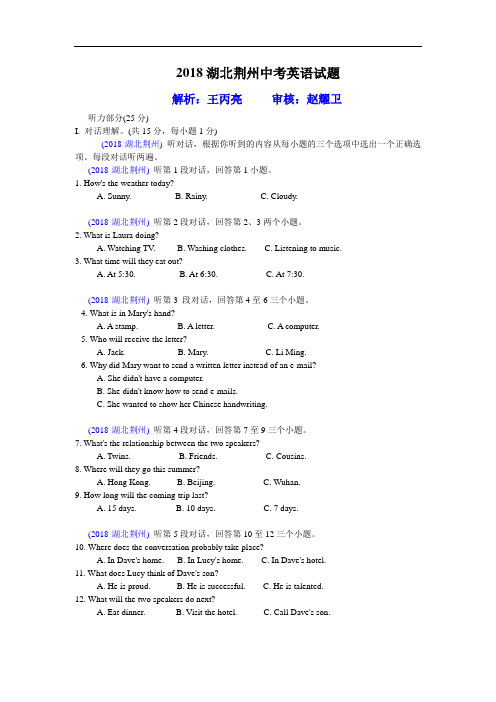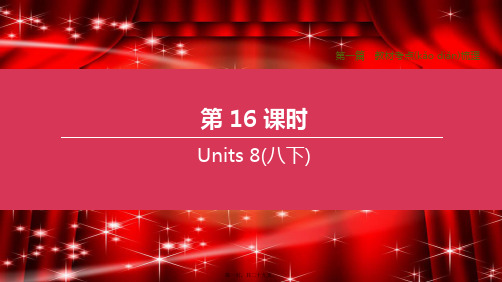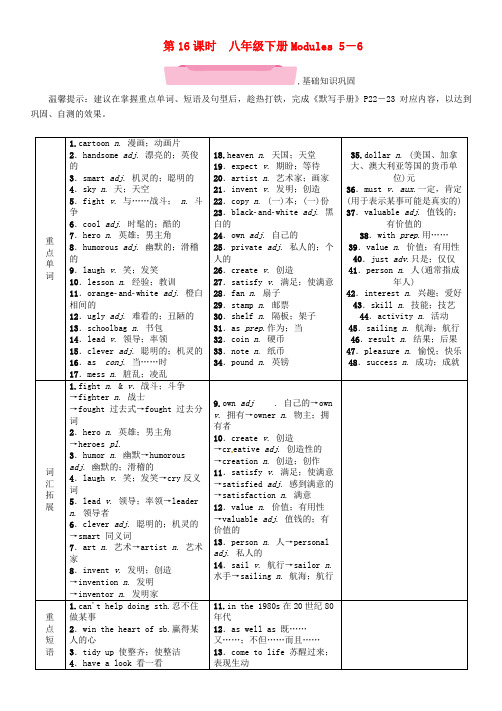2018年中考英语复习湖北专用考点精讲-16
- 格式:pptx
- 大小:5.39 MB
- 文档页数:8

2018湖北荆州中考英语试题解析:王丙亮审核:赵耀卫听力部分(25分)I. 对话理解。
(共15分,每小题1分)(2018·湖北荆州) 听对话,根据你听到的内容从每小题的三个选项中选出一个正确选项。
每段对话听两遍。
(2018·湖北荆州) 听第1段对话,回答第1小题。
1. How's the weather today?A. Sunny.B. Rainy.C. Cloudy.(2018·湖北荆州) 听第2段对话,回答第2、3两个小题。
2. What is Laura doing?A. Watching TV.B. Washing clothes.C. Listening to music.3. What time will they eat out?A. At 5:30.B. At 6:30.C. At 7:30.(2018·湖北荆州) 听第3 段对话,回答第4至6三个小题。
4. What is in Mary's hand?A. A stamp.B. A letter.C. A computer.5. Who will receive the letter?A. Jack.B. Mary.C. Li Ming.6. Why did Mary want to send a written letter instead of an e-mail?A. She didn't have a computer.B. She didn't know how to send e-mails.C. She wanted to show her Chinese handwriting.(2018·湖北荆州) 听第4段对话,回答第7至9三个小题。
7. What's the relationship between the two speakers?A. Twins.B. Friends.C. Cousins.8. Where will they go this summer?A. Hong Kong.B. Beijing.C. Wuhan.9. How long will the coming trip last?A. 15 days.B. 10 days.C. 7 days.(2018·湖北荆州) 听第5段对话,回答第10至12三个小题。


2018年中考英语语法知识点总结(名师总结教材重点,绝对精品,建议大家下载打印背诵)名词名词的种类专有名词普通名词国名、地名、人名、团体、机构名称可数名词不可数名词个体名词、集体名词抽象名词、物质名词考点1:可数名词一、基本用法(1)可数名词后可以加-s或-es构成复数形式,用于表达超过―一个‖的数的概念。
(2)只与可数名词复数连用的单词:few(几乎没有),a few(一些), many/a great many(许多)(3)既能与可数名词连用也能与不可数名词连用的单词:some, any, a lot of/lots of, plenty of。
例如:There is some/a lot of milk in the bottle.There are some/a lot of flowers in the garden.二、名词单复数规则变化规律例词①一般在词尾直接加s book—books chair—chairs②以s, x,o, sh, ch结尾的单词通常在词尾加es class—classes box—boxes brush—brushes watch—watches③以辅音字母+y结尾的词,把y改i,再加es但以元音+y结尾的词,则直接在词尾加s family—families factory—factories key—keys monkey—monkeys④以o结尾的词,有生命的名词加es但无生命名词则直接加s,如:potato—potatoes tomato—tomatoes hero—heroes radio—radios zoo—zoos⑤以f或fe结尾的词,改f或fe为v 加es leaf—leaves thief—thieves三、名词复数的不规则变化规律例词①变中间的元音字母man—men,woman—women,foot—feet,tooth—teeth, child—children, mouse—mice②表示―某国人‖的名词单复变化(记忆口决:中日不变英法变,其余s 加后面。

第16课时八年级下册Modules 5-6,基础知识巩固温馨提示:建议在掌握重点单词、短语及句型后,趁热打铁,完成《默写手册》P22-23对应内容,以达到巩固、自测的效果。
→cr eativewith 续表012 have bought about 200 h,重难词句选析1. fight v . 与……战斗n .战斗;斗争(教材P34) 【点拨】(1)fight 作动词,意为“打架;战斗”,常构成短语:fight for(为……而战),fight against(对抗……)和fight with sb./have a fight/fights with sb.(同……一起战斗)。
如:They fight for freedom.他们为自由而战。
We must fight against unfairness.我们必须反抗不公正。
They will fight with you.他们会和你一起战斗。
(2)fight 还可以作动词,意为“打架;打仗”。
如: There is a fight in the park.有人在公园打架。
【即时训练】根据汉语提示补全句子。
(1)The soldiers will __fight__for__(为……而战) their country.(2)Each of us has a duty to __fight__against__(与……作斗争)pollution.(3)My parents always tell me not to __fight__with__(与……打架) my classmates.2.expect v. 期盼;等待(教材P36)【点拨】expect作及物动词,意为“期盼;等待”。
后接名词、代词或动词不定式作宾语,也可接动词不定式作宾语补足语,即expect sb.to do sth.(期望某人做某事);还可接that从句,当expect接否定的that从句时,否定要前移。

第十六讲九年级 Units 1—2Ⅰ.单项填空1.[2018山西改编]Reading the first of each paragraph before you read the whole text helps you get the main idea quickly.A. letterB. wordC. sentenceD. text2.Practice speaking English as often as possible. Only this way can we learn English well.A. atB. byC. onD. without3.[2018合肥蜀山区二测]It takes us less time to go to Shanghai because the of trains has increased a lot.A. priceB. speedC. spaceD. service4.[2018芜湖27中二模]—Could you tell me what's the meaning of the word?—I'm afraid you need to in a dictionary.A. look at itB. look for itC. look around itD. look it up5.—Jack won first prize in the competition.—Yes. The news really quickly. Now everybody in our school has known it.A. spreadB. leftC. connectedD. jumped6.[2019预测]—How many eggs has that hen ?—Nearly one hundred.A. layB. laidC. liedD. lain7.[2018合肥包河区二测]No hurry! Please your time.A. takeB. saveC. setD. value8.[2018合肥50中三测] awful weather we are having! It's raining again.A. WhatB. What anC. HowD. What a9.[2019预测]Do you know Beijing or not tomorrow?A. whether are they leaving forB. whether they are leaving forC. if they were leaving forD. if were they leaving for10.[2019预测]The boats take different routes, but they all in the same place.A. give upB. clear upC. end upD. make upⅡ.完形填空[2018湘西州改编]Students learn their lessons in class. They sit in the classroom listening to their 1 . This is a way of 2 . Is this the only way for students to learn? Of course not. There is another 3 to learn.Students can teach 4 . For example, if you can't remember 5 when you are doing your homework, what will you do? You can look it up in your book to find the answer. Then, how to teach yourself? The first thing you must do is 6 . Read something you are interested in, 7 that you have to read. The second is that you must ask yourself questions. A clever student is usually 8 asking questions. The 9 is to answer the questions yourself. These are the ways of teaching yourself.If you 10 doing like these for a long time, you are sure to have great progress in your study.1.A. parents B. relatives C. friends D. teachers2.A. thinking B. learningC. workingD. exercising3.A. plan B. skill C. way D. result4.A. ourselves B. yourselvesC. myselfD. themselves5.A. anything B. nothing C. none D. both6.A. listening B. reading C. writing D. speaking7.A. or B. because C. but D. so8.A. afraid of B. sure ofC. good atD. tired of9.A. four B. fourth C. three D. third10.A. remember B. practice C. love D. avoidⅢ.补全对话W: You look worried, David. What's wrong?M: 1W: You said you liked English. 2M: I find it difficult to do English reading, especially reading a longer passage. W: That doesn't sound too bad.M: 3 What should I do?W: Just read quickly to get the main idea at first. Don't read word by word. Read word groups.M: 4W: Guess a word's meaning by reading the sentences before and after it. You probably understand more than you think.M: That sounds difficult.W: Well, be patient. 5 You can improve your English reading by more practice. The more you read, the faster you will be.M: I'll try. Thank you, Mrs. Black.Ⅳ.阅读理解ATomb-Sweeping Day is a Chinese holiday that has been celebrated in China for centuries. Every year in early April, tens of thousands of people in China visit the tombs of their ancestors to show their respect.On the day, Chinese families sweep away the grass around the tombs. Then they burn paper money and put flowers and fruit in front of the tombs. They hope the dead can enjoy them and bring the family good luck.However, it is not only the Chinese who remember the dead. People in other countries also have festivals for the dead.In Japan, Obon(盂兰盆节)is one of the most important festivals. It lasts for three days. However, its starting date varies in different areas of Japan. It is also a holiday that serves as family reunion(团圆).During Obon,Japanese people return to their hometown and visit their ancestors' tombs.They also believe their ancestors' spirits return home to be reunited with their family. People perform the "Bon Odori" dance(盆舞) to welcome the spirits. On the last day of Obon, they put paper lanterns in a river to send off the spirits.In Russia people remember their ancestors on the Day of Rejoicing. The name of this festival means birth and happiness. Russians believe that people shouldn't feel sad for the dead because death means birth in another world.On the Day of Rejoicing, Russian people draw beautiful pictures on eggs and put them in front of tombs. After that they have a picnic together. They hope for a good life for both the living and the dead.1.What do we know about Tomb-Sweeping Day?A.It's a day to respect the dead.B.It falls on April 24th every year.C.People grow grass beside the tombs on that day.D.It's said that people can see the dead on that day.2.We know the following about Obon EXCEPT that .A.it is a Japanese festivalB.it lasts for three daysC.it's also a family reunion dayD.paper lanterns are used to welcome the spirits3.What do Russian people think of death?A.It's a sad thing.B.They feel happy about it.C.It means a good life for the dead.D.It means birth in another world.4.What does the passage mainly talk about?A.History of Tomb-Sweeping Day.B.How to remember the dead.C.Meanings of death in different countries.D.Festivals in some countries to remember the dead.B[2018福建A卷]Many Chinese people will wonder what presents to get for their moms on Mother's Day, but not many know Mother's Day is actually a festival from overseas.Mother's Day originated(起源) in America during the early 20th century.The festival spread to China as early as the 1980s and was widely accepted.Why did a foreign festival become popular in China? In fact, Chinese traditional culture has always encouraged filial (子女的) devotion to parents.There are many stories which show filial respect in ancient China.For example, the story of "Taste Liquid (液体的) Medicine for Mother" tells us the filial virtue (美德) of Emperor Wen of the Western Han Dynasty.His mother had been sick for three years.He oftenstayed up by her bedside and cared for her day and night.He tasted the liquid medicine first before she drank it.Also, mother love is a repeated subject in Chinese ancient poems, like "Song of the Parting Son" by Meng Jiao, a poet of the Tang Dynasty.Now this poem is still a must in the school textbooks. Children in China are brought up with the education of filial devotion.On special days, people often use roses or forget-me-nots to express love.Carnations are considered as the perfect flowers for mothers around the world,but few know that China has its own flower for mothers — the tiger lily.Love for mothers can have different ways of expression.What matters most is love,not the festival itself.What mothers truly want is perhaps just a simple expression of love from their children.5. When did Mother's Day spread to China?A.In the 1920s.B.In the 1980s.C.In the Western Han Dynasty.D.In the Tang Dynasty.6. What is the poem of "Song of the Parting Son" mainly about?A.The filial virtue of Emperor Wen.B.Caring for the old.C.Traditional Chinese medicine.D.A mother's love for her son.7.Mother's Day is popular in China mainly because of .A.its wide spread in many countriesB.our ancient stories of respecting parentsC.our traditional cultural valuesD.its simple way of expressing love8. What is regarded as China's own flower for a mother?9. What a mother truly wants on Mother's Day may be .A.a big dinnerB.a celebration partyC.greetings of the festivalD.expensive presentsⅤ.书面表达[2018金华]在即将举行的中学生国际文化交流活动中,你将代表学校介绍中国的传统节日。

湖北省荆州市2018年中考英语真题试题听力部分(25分)I、对话理解。
(共15分,每小题1分)听对话,根据你听到的内客从每小题的三个选项中选出一个正确选项。
每段对话听两遍。
听第1段对话,回答第1小题。
1. How’s the weather today?A. Sunny.B. Rainy.C. Cloudy.听对话,回答下面的小题。
2. What is Laura doing?A. Watching TV.B. Washing clothes.C. Listening to music.3. What time will they eat out?A. At 5:30.B. At 6:30.C. At 7:30.听对话,回答下面的小题。
4. What is in Mary’s hand?A. A stamp.B. A letter.C. A computer.5. Who will receive the letter?A. Jack.B. Mary.C. Li Ming.6. Why did Mary want to send a written letter instead of an e-mail?A. She didn’t have a computer.B. She didn’t know how to send e-mail.C. She wanted to show her Chinese handwriting.听对话,回答下面的小题。
7. What’s the relationship between the two speakers?A. Twins.B. Friends.C. Cousins.8. Where will they go this summer?A. Hong Kong.B. Beijing.C. Wuhan.9. How long will the coming trip last?A. 15 days.B. 10 days.C. 7 days.听对话,回答下面的小题。
湖北省黄冈市2018年中考英语真题试题(考试时间120分钟满分120分)亲爱的同学,在你答题前,请认真阅读下面的注意事项:1.答卷前,考生务必将自己的姓名、准考证号填写在试题卷和答题卡上,并将准考证号条形码粘贴在答题卡上的指定位置。
2.选择题每小题选出答案后,用2B铅笔把答题卡上对应题目的答案标号涂黑。
如需改动,用橡皮擦干净后,再选涂其他答案标号。
答在试题卷上无效。
3.非选择题的作答:用0.5毫米黑色墨水签字笔直接答在答题卡上对应的答题区域内。
答在试题卷上无效。
4.考生必须保持答题卡的整洁。
考试结束后,请将本试题卷和答题卡一并上交。
第Ⅰ卷 (选择题88分)一、听力测试(共三节;计25分)第一节(共5小题;每小题1分,满分5分)听句子。
从每小题所给的A、B、C三个选项中,选出与所听句子内容相符的图片。
听完每句子后,你将有5秒钟的作答时间。
每个句子读两遍。
1.2.3.4.5.第二节(共15小题;每小题1分,满分15分听下面6段对话。
每段对话后面有几个小题,从题后所给的A、B、C三个选项中选出最佳选项。
听完每段对话后,你将有10秒钟的作答时间。
每段对话读两遍。
听第6段对话,回答第6、7小题。
6. What kind of shows does mark like?A. Sitcoms.B. The news.C. Talk shows.7. What does Sally think of soap operas?A. She doesn't mind them.B. She can't stand them.C. She loves them.听第7段对话,回答第8、9小题。
8. What was Linda doing at eight?A. She was helping her mom.B. She was taking a shower.C. She was sleeping.9. Why did Bruce call Linda so many times?A. He needed help with his homework.B. He wanted Linda to do his homework.C. He couldn't get help from Jenny.听第8段对话,回答第10、11小题。
2018湖北荆州中考英语试题解析:王丙亮审核:赵耀卫听力部分(25分)I. 对话理解。
(共15分,每小题1分)(2018·湖北荆州) 听对话,根据你听到的内容从每小题的三个选项中选出一个正确选项。
每段对话听两遍。
(2018·湖北荆州) 听第1段对话,回答第1小题。
1. How's the weather today?A. Sunny.B. Rainy.C. Cloudy.(2018·湖北荆州) 听第2段对话,回答第2、3两个小题。
2. What is Laura doing?A. Watching TV.B. Washing clothes.C. Listening to music.3. What time will they eat out?A. At 5:30.B. At 6:30.C. At 7:30.(2018·湖北荆州) 听第3 段对话,回答第4至6三个小题。
4. What is in Mary's hand?A. A stamp.B. A letter.C. A computer.5. Who will receive the letter?A. Jack.B. Mary.C. Li Ming.6. Why did Mary want to send a written letter instead of an e-mail?A. She didn't have a computer.B. She didn't know how to send e-mails.C. She wanted to show her Chinese handwriting.(2018·湖北荆州) 听第4段对话,回答第7至9三个小题。
7. What's the relationship between the two speakers?A. Twins.B. Friends.C. Cousins.8. Where will they go this summer?A. Hong Kong.B. Beijing.C. Wuhan.9. How long will the coming trip last?A. 15 days.B. 10 days.C. 7 days.(2018·湖北荆州) 听第5段对话,回答第10至12三个小题。
湖北省黄冈市2018年中考英语试题第Ⅰ卷一、听力测试第一节听句子。
从每小题所给的A、B、C三个选项中,选出与所听句子内容相符的图片。
听完每句子后,你将有5秒钟的作答时间。
每个句子读两遍。
1.A. B. C.2.A. B. C.3.A. B. C.4.A. B. C.5.A. B. C.第二节听下面6段对话。
每段对话后面有几个小题,从题后所给的A、B、C三个选项中选出最佳选项。
听完每段对话后,你将有10秒钟的作答时间。
每段对话读两遍。
听第6段对话,回答第6、7小题。
6. What kind of shows does mark like?A. Sitcoms.B. The news.C. Talk shows.7. What does Sally think of soap operas?A. She doesn't mind them.B. She can't stand them.C. She loves them.听第7段对话,回答第8、9小题。
8. What was Linda doing at eight?A. She was helping her mom.B. She was taking a shower.C. She was sleeping.9. Why did Bruce call Linda so many times?A. He needed help with his homework.B. He wanted Linda to do his homework.C. He couldn't get help from Jenny.听第8段对话,回答第10、11小题。
10. What do they like about Sunshine Restaurant?A. The pictures.B. The loud music.C. The food.11. Why doesn't Amy want to go to the Blue Ocean?A. The soft music makes her sleepy.B. She doesn't like the environment.C. Their hamburgers aren't good.听第9段对话,回答第12、13、14小题。